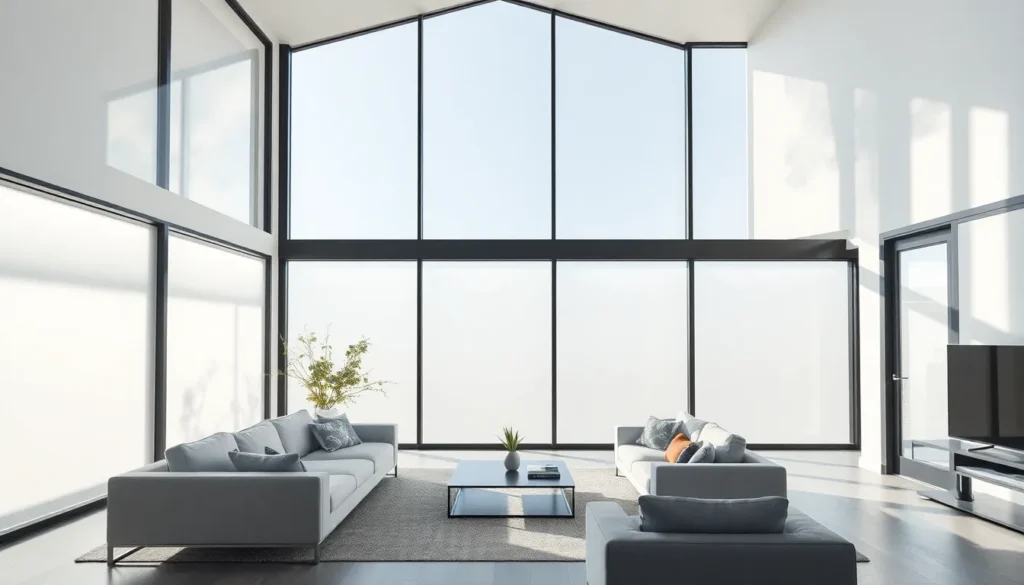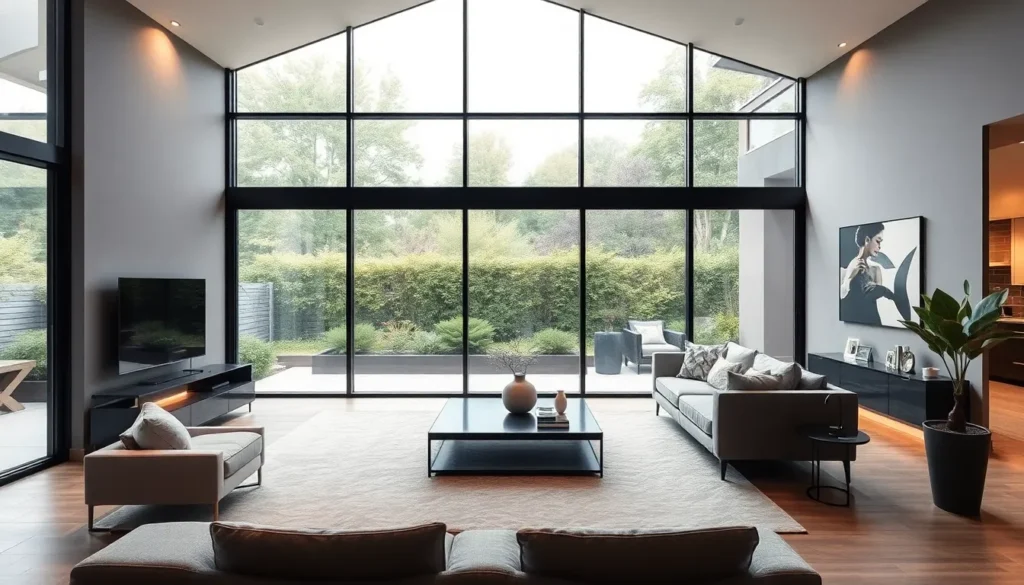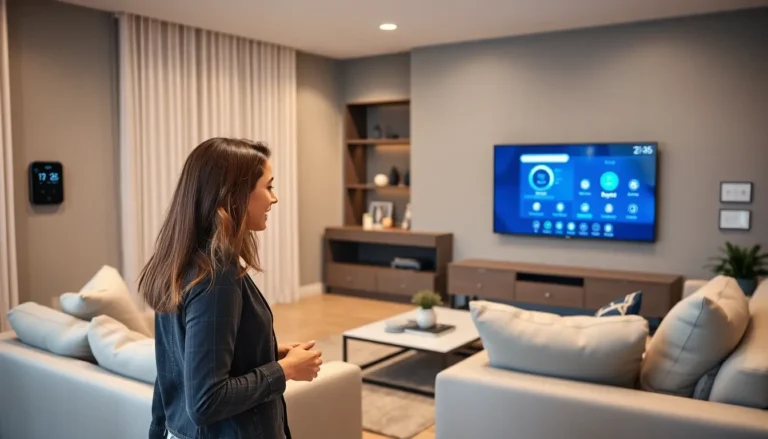Imagine a world where your windows do more than just let in light. Smart glass is here to turn that dream into reality, transforming ordinary homes into futuristic havens. With just a touch of a button, homeowners can control privacy, reduce glare, and even save on energy bills. Who knew windows could be so smart?
Table of Contents
ToggleWhat Is Smart Glass for Homes?
Smart glass, also known as switchable glass, transforms traditional windows into advanced energy-efficient components. This technology allows homeowners to control the transparency and opacity of glass surfaces, offering enhanced privacy and glare reduction. Moreover, smart glass can adjust its properties based on light levels, contributing to energy savings.
Devices employ electrochromic or thermochromic technologies to change from clear to opaque. Systems can be controlled manually via switches or automatically through sensors. Styles of smart glass include sliders and panels, ideal for various home applications. Applications extend to windows, doors, and even skylights, ensuring flexibility in design.
Energy efficiency represents another critical aspect of smart glass functionality. Research indicates that it can reduce heating and cooling costs by up to 30%. Homeowners benefit not only from climate control but also from improved indoor comfort.
Additionally, smart glass enhances aesthetic appeal in residences. Designs integrate seamlessly with modern architecture, allowing for unobstructed views without compromising on style. Enhancements in usability arise from user-friendly controls, making this technology accessible to all.
Investments in smart glass may yield significant long-term savings. As the market for smart home technologies expands, smart glass becomes increasingly affordable. It offers a promising solution for homeowners looking to upgrade their living spaces with innovative, energy-efficient technology.
Benefits of Smart Glass for Homes

Smart glass offers significant advantages for homeowners, enhancing comfort and functionality in living spaces. It improves energy efficiency, privacy control, and aesthetic appeal.
Energy Efficiency
Smart glass effectively reduces energy consumption in homes. Utilizing electrochromic or thermochromic technology, it adjusts its transparency based on sunlight exposure. Homeowners can expect up to 30% savings on heating and cooling costs. This adaptability leads to a more consistent indoor temperature, reducing reliance on HVAC systems. Energy-efficient glazing helps lower overall utility bills, making it an appealing upgrade in current markets.
Privacy Control
Privacy control represents another key benefit of smart glass. With a simple touch, users can switch from clear to opaque glass. This feature allows for increased privacy without sacrificing natural light. Homes equipped with smart glass can maintain secure environments in bathrooms, bedrooms, or home offices. The balance between openness and seclusion meets various lifestyle needs, ensuring comfort in any space.
Aesthetic Appeal
Smart glass enhances the aesthetic appeal of homes. Its sleek, modern appearance complements contemporary architecture seamlessly. Homeowners appreciate the minimalist design that blends functionality with style. Various applications, such as windows, doors, and skylights, offer versatility to different rooms. Customizable options allow homeowners to align smart glass with individual design preferences, enhancing the overall ambiance of living spaces.
Types of Smart Glass for Homes
Smart glass technology comes in various types, each designed to enhance convenience, comfort, and energy efficiency in homes. Understanding these types helps homeowners choose the right solution for their needs.
Electrochromic Glass
Electrochromic glass features a specialized coating that changes tint in response to an electrical charge. This technology allows users to adjust the glass’s transparency to control light and heat entry. Homeowners can achieve optimal privacy and comfort with simple electronic controls. Studies indicate that this glass can reduce glare considerably while enhancing energy efficiency by minimizing heating and cooling demands. Applications range from windows to doors, making electrochromic glass a versatile choice for residential projects.
Switchable Glass
Switchable glass offers versatility through its ability to transition between transparent and opaque states at the flick of a switch. This glass type is particularly effective for enhancing privacy, as it can seamlessly maintain natural light while preventing visibility. It utilizes a polymer dispersed liquid crystal film that aligns with an electric current, allowing flexibility in design and functionality. Homeowners appreciate its aesthetic appeal and modern look, making it ideal for interior spaces such as office partitions and bathroom windows.
Thermochromic Glass
Thermochromic glass reacts to temperature changes by altering its tints. In response to heat, this glass becomes darker, which helps reduce solar heat gain and glare. Households experience consistent indoor temperatures as this type of glass works to protect interiors from excessive sunlight. Perfect for large windows and skylights, thermochromic glass enhances energy efficiency by lowering cooling costs during warmer months. Homeowners benefit from a reduced carbon footprint while enjoying a comfortable living environment.
Applications of Smart Glass in Residential Properties
Smart glass technology finds various applications in residential properties, enhancing aesthetics and functionality.
Windows and Doors
Smart glass can revolutionize windows and doors in homes. Homeowners gain control over natural light and energy efficiency with adjustable transparency. When sunlight increases, smart glass can darken to reduce heat gain, leading to lower cooling costs. Clear views are maintained when desired, allowing for an optimal balance of privacy and light. Residents enjoy enhanced comfort as a result of consistent indoor temperatures throughout the day. Design options for windows and doors incorporate smart glass seamlessly into contemporary architecture.
Skylights
Incorporating smart glass in skylights enhances natural lighting while controlling temperature. The use of electrochromic technology allows these skylights to adjust based on sunlight intensity. When direct sunlight shines through, the skylight can become tinted, reducing glare. Reduced need for artificial lighting during the day saves energy and lowers electricity bills. The ability to control the amount of solar heat that enters also results in a more comfortable home environment. Homeowners appreciate the aesthetic benefits along with energy savings.
Room Dividers
The application of smart glass as room dividers provides flexibility within living spaces. By switching between transparent and opaque states, these dividers offer privacy when needed while maintaining an open feel. This feature is particularly valuable in multifunctional areas, where rooms serve multiple purposes. Homeowners can enjoy natural light flowing through without compromising privacy. Additionally, smart glass dividers can complement modern interiors and boost the overall appeal of the home.
Smart glass is revolutionizing the way homeowners approach design and functionality. By seamlessly integrating advanced technology into everyday living spaces, it offers a unique blend of energy efficiency and aesthetic appeal. The ability to control privacy and light levels enhances comfort while contributing to significant energy savings.
As this innovative technology becomes more accessible, homeowners can look forward to a future where smart glass transforms not just windows but entire living environments. With its versatility and modern design, smart glass stands as a compelling choice for those seeking to elevate their homes. Embracing this trend means investing in a sustainable and stylish lifestyle that meets the demands of contemporary living.





